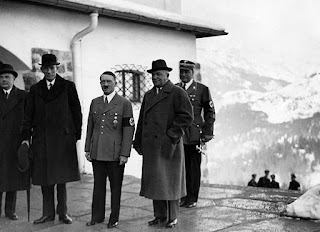Another prominent Briton visits Hitler at Berchtesgaden
The British government’s attempt
to present Lord Halifax’s visit to Germany as an “unofficial” exercise began to
look exceedingly threadbare when Halifax travelled on from Berlin to see the Führer
at his mountain retreat at Berchtesgaden. Ostensibly Halifax had gone to Berlin
to attend the International Hunting Exhibition but travelling the extra 700km
or so to Bavaria made plain his journey’s true purpose. Halifax long afterwards
claimed to have mistaken Hitler for a footman when he first saw him but there
is no sign that he treated him with anything less than the deference due to a
head of state at the time. The talks did not produce any immediately practical
results, but Halifax did refer to the possibility of boundary changes in
eastern Europe, a tacit signal to Hitler that Britain had no objection in
principle to revision of the Versailles settlement.
Official statements that Maxim
Litvinov the Soviet Foreign Minister was a “great and worthy” champion of the
regime dampened speculation as to his future. These had been prompted by his
rapid and unheralded departure from the token and ineffectual Brussels conference
on the Japanese invasion of China combined with the extension of Stalin’s
purges to senior diplomats from military officers and Party functionaries. Litvinov
who remained in office for another couple of years proved to be one of the few
old Bolsheviks who survived Stalin’s suspicions and jealousy during the great
purges although there is some suspicion that his death in 1951 was not natural.
The weakness of British aviation
policy was cruelly exposed when Parliamentary pressure forced the government to
open an inquiry by Lord Cadman into civil aviation. Anomalously the Air Ministry
was responsible for both civil and military and was not felt to be doing particularly
well on either score. It was accused of neglecting commercial aviation because
it was more of a service ministry for the RAF. Britain’s leading airline,
Imperial Airways, was an unhappy blend of a private company under state
control, unsure whether it was a commercial business of a national flag
carrier. Its aircraft were old and unsuitable.



Comments
Post a Comment